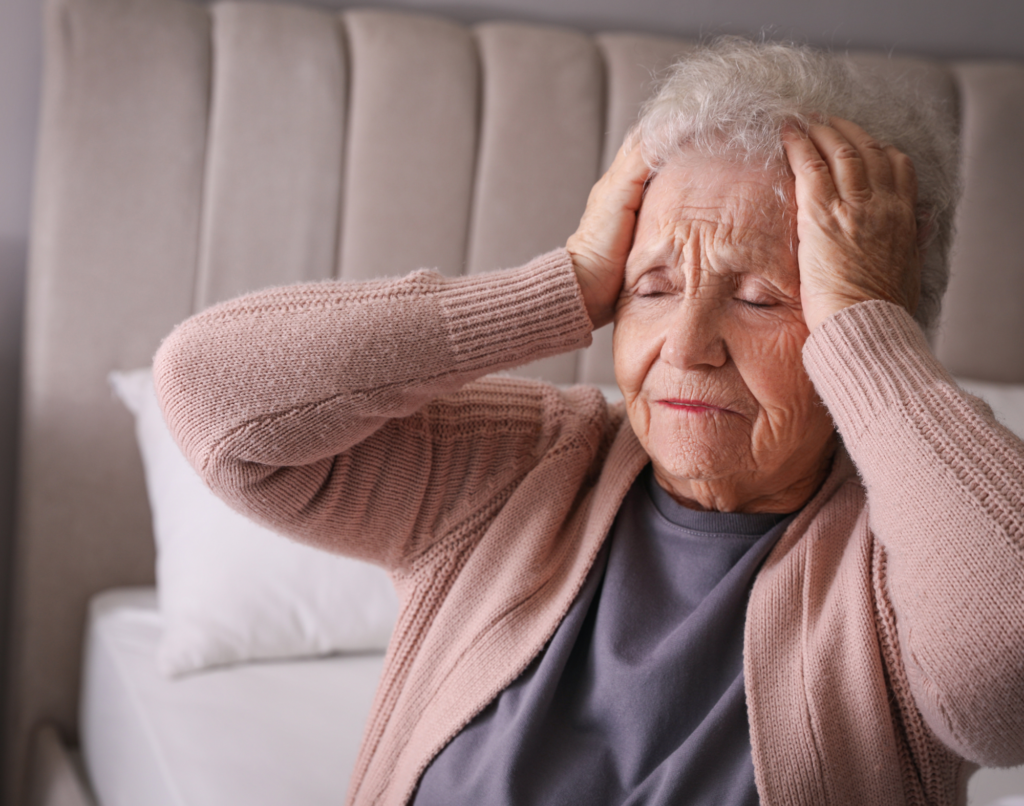Night can be a frightening time for Seniors who live alone. Many Seniors become anxious or scared at night due to physical changes that come with aging. Psychological stress and dementia can lead to night fright in Seniors. Sundown Syndrome and night terrors are two types of nighttime disturbances that may occur with age. Some Seniors become agitated or aggressive after the sun goes down. Others wake from sleep, confused and afraid.
Nightmares are not the same thing as night terrors. When waking from a nightmare, people remember part of the dream. With night terrors, Seniors remain asleep and don’t remember it in the morning.
Sundowning
One type of late-day confusion is called Sundown Syndrome or sundowning. As the sun sets, some Seniors with dementia and Alzheimer’s disease may develop behavior changes, such as acting confused, irritable, or aggressive. Some may yell, pace the room, or wander off. This can be especially dangerous due to the increased risk of falls and injuries at night.
Sundowning isn’t a disease but rather a symptom of dementia. The exact reason behind it is unknown, but the trigger seems to be the fading of daylight. The symptoms get worse as the night progresses. Seniors typically return to normal behavior in the morning.
The area of the brain that controls processing and reasoning degrades in dementia patients. This can alter a person’s internal clock that signals sleep and wake patterns. While the actual cause of Sundown Syndrome is unclear, factors may include:
- Fatigue
- Low light
- Disruptions to circadian rhythms
- Increased shadows
- Unfamiliar surroundings
- Sleep problems
- Hunger or thirst
- Boredom
- Depression
- Pain

Night Terrors
Sleep problems are common among adults with dementia and Alzheimer’s. Seniors with depression, anxiety, and sleep apnea are also more likely to have night fright. Some Seniors experience intrusive worry or excessive feelings of dread at night. Others have recurring night terrors. These nighttime episodes happen while the person is asleep. The Senior appears to awaken and show signs of fear and agitation.
Night terrors typically happen early in the sleep cycle. They usually only last for under a minute, but severe cases can be as long as 10 minutes. The sleeper lies down after a few moments and does not recall the episode when they wake up. Seniors may experience these episodes regularly, or they might happen periodically throughout the year. Symptoms of night terrors include:
- Sitting up in bed and screaming or crying
- Staring blankly
- Flailing and thrashing in bed
- Rapid breathing
- Being flushed, sweating, and confused
4 Tips for Reducing Night Fright In Seniors
1. Stay On Schedule
Maintain a predictable schedule for meals, medication, bedtime, and waking time. Set bedtime to provide 7 to 8 hours of sleep each night. Be careful with daytime napping. If your loved one needs to sleep during the day, schedule a 20-minute power nap after lunch. Schedule some time to get outside. Seniors need sun exposure during the day to correct circadian rhythms. Finally, create a bedtime routine. Doing the same things every night before bed conditions the brain to be ready for sleep.
2. Avoid Overstimulation
Wind down for at least 30 minutes before bedtime. Quiet reading, listening to peaceful music, or engaging in relaxation exercises can get Seniors in the frame of mind for sleep. Dim artificial lighting and disconnect from devices. Too much stimulation in the evening, be it from caffeine or watching TV, can make it hard for Seniors to maintain good sleep patterns.
3. Create a Sleep-Friendly Bedroom
Turn the bedroom into a sleep sanctuary. Having a TV, desk, or other equipment in the bedroom conditions the mind that the bedroom is a place of activity, not rest. Limit noise and distractions outside the bedroom as much as possible. Minimize light exposure. Turn down the thermostat. Temperatures between 66 and 68 degrees Fahrenheit are ideal for sleeping.
4. Seek Medical Advice
Talk to a health care professional about any possible underlying condition such as a urinary tract infection or sleep apnea, which might worsen sundowning behavior. Also, ask if a low dose of melatonin might be right for your loved one. Seeing a therapist can be helpful, primarily when night fright is associated with stress, anxiety, or depression.
Get Help For Seniors Who Live Alone
Hiring an overnight or live-in caregiver is one of the most effective ways to protect your loved ones. An overnight or live-in Certified Homemaker-Home Health Aide (CHHHA) can help your Senior loved ones cope with their fears and reduce night fright. Sometimes just having a familiar presence gives Seniors comfort. It also helps maintain a regular schedule of meals, activities, and bedtime, which leads to a healthier lifestyle.
Is your Senior loved one experiencing night fright? The CHHHAs at Anita’s Angels, Inc. are here to help. We are Families Helping Families. Call us at 908-788-9390 to learn about our overnight and live-in care options.





